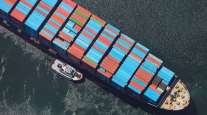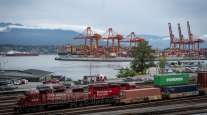IMO 2020 Could Shift Freight Patterns, Increase Costs

[Stay on top of transportation news: Get TTNews in your inbox.]
LONG BEACH, Calif. — A panel representing the shipping industry spoke about the looming International Maritime Organization mandate that will require cargo vessels to burn low-sulfur diesel, and shippers and carriers said the requirements could lead to price increases or the rerouting of freight.
Walmart Inc. discussed the rules, referred to as IMO 2020 and which will take effect Jan. 1, with carriers when it entered into negotiations for the contract year that started in May, said Laura Crowe, Walmart director of global logistics. Crowe, a panelist, discussed the issue Sept. 18 here at IANA Intermodal Expo 2019.
“We wanted to be sure carriers were trying to recoup cost, not make a profit,” she said, adding that Walmart tried to understand when ocean carriers would have to start transitioning and agreed to increase the contract on a set date based on the cost and distance of a shipment. “We didn’t want to pay any bill they threw at us.”

Also at IANA
Crowe added that, in general, Walmart doesn’t like taking increases. “Unless it is a planned increase, we’re not going to take it,” she said.
WANT MORE NEWS? Listen to today's Daily Briefing
Lawrence Burns, senior vice president of trades and sales for Hyundai America Shipping Agency, said there are a lot of moving parts within the IMO 2020 mandate, and the carrier has questioned the availability of fuel in ports.
“There may not be enough fuel in the ports at this time,” Burns said, adding that the ocean carrier is looking at contingency plans.
It is difficult to track the cost of the maritime fuel because the product hasn’t been sold yet, but the increased demand for low-sulfur fuel could drive diesel prices higher next year.
“The magnitude of that impact is nebulous right now,” said Sarthak Verma, senior vice president of international for J.B. Hunt Transport Services, which is based in Lowell, Ark. J.B. Hunt ranks No. 4 on the Transport Topics Top 100 list of the largest for-hire carriers in North America.

A cargo ship generating pollution. The IMO 2020 mandate goes into effect Jan. 1. (Getty Images)
Burns said if IMO 2020 impacts the fuel supply, he believes governments would step in and relax regulations until the situation improves.
“We’re concerned about that supply, but if it gets too out of hand, there has to be something else that bends,” he said.
Over the past five to 10 years, some shippers have shifted port strategy from the West Coast to East Coast, Verma said.
“Now if there is a relative meaningful impact to the East Coast due to increased costs, shippers may say, ‘I need to rediversify to the West Coast,’ ” he said. “It is up to an individual shipper to know what their total landed costs are going to be and make that decision.”
Verma told attendees that from an intermodal perspective, a bigger share of freight moving to the East Coast would impact the total network.
“At J.B. Hunt, we’re fairly agnostic to the direction the freight flows,” he said. “From a marketing perspective, we don’t care either way, but it doesn’t happen overnight. You have to have planning that shifts.”

An alternative to using low-sulfur diesel is to install scrubber technology on ships to remove pollutants and get sulfur oxide emissions to required levels.
Scrubbers cost $5 million to $8 million, which is a significant investment, Burns said. He told attendees he believes there will be a transition over a year to two years, when all ships that want to be equipped with scrubbers can be, but the initial impact coming into 2020 may not allow for that.
What’s more, scrubbers create another issue — sludge resulting from the captured sulfur.
“There wasn’t a whole thought process on what do we do with the sludge,” SeaIntelligence Consulting CEO Lars Jensen said.
He added that the industry has had 12 to 13 years to prepare, but it seems nobody did anything until the past 12 to 18 months. “Now very basic issues, such as what to do with the sludge, are yet to be resolved,” he said.
Burns expects to see rules related to sludge.
Walmart is drawing on the experiences with IMO 2020 to help prepare for future environmental regulations, which call for a 20% reduction in carbon dioxide by 2030 and a 50% reduction by 2040.
“Today, we need to start looking at technology and finding a majority fit everyone can invest in. I think it is our job to let carriers know we’re willing to have those conversations,” Crowe said, adding that she doesn’t want the industry to wait until 2029 to discuss it.
Burns said he has seen industry support as the maritime industry prepares for IMO 2020, which he called a global issue. He said his conversations with importers and exporters have been positive.
“As long as it doesn’t erode their margins,” he said, “I think there is a willingness to come up and help us.”




